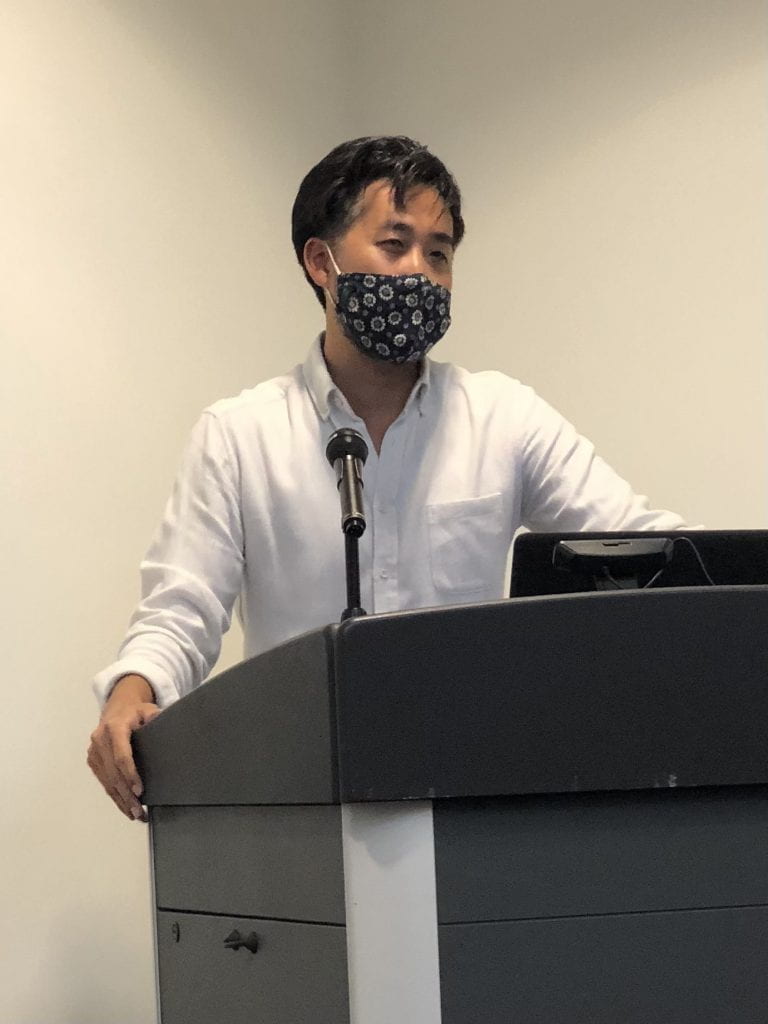By Hailey Williams and Jammie Huynh
Dr. Jason Koo visited the College of Charleston on January 20 to kick off the Spring semester’s Dorothea Benton Frank Writing Series with an Industry Talk. MFA Director, Dr. Emily Rosko spoke to a large gathering of CofC’s student-writers, saying she was “delighted to have Jason Koo here to speak today about his experiences and the challenges with starting and growing a nonprofit literary organization.”
With the 10th anniversary of Brooklyn Poets approaching (on Walt Whitman’s birthday), Koo said he has “much to celebrate, not the least of which is the opening of our first brick-and-mortar space at 144 Montague Street in Brooklyn Heights.” Despite this, the sense of achievement is still difficult to grasp. There’s so much left to do.
He painted us a picture of Brooklyn Poets’ new home: “The landlord hasn’t bothered to clean the place. Someone’s iced coffee from Starbucks is still sitting on a ledge inside, unmoved since my first visit last September.” With much to do for the new space, the balancing act of serving as Executive Director of Brooklyn Poets while also working as an English professor at Quinnipiac University, and a baby on the way, there is an urgency to get things done. Koo reflected on the big picture: “When I think about all these costs and the new management skills I’ll have to learn on the fly, I think it all seems a little crazy.” The room lightened with this touch of levity. He felt it might be useful to give us a “a sense of the furious what-the-fuck-was I-thinking thinking that goes into a venture like Brooklyn Poets.”
Though Jason Koo admired CofC’s MFA program for offering an Arts and Cultural Management emphasis alongside the Studio track, he admitted that “if faced with a choice between that and the Studio emphasis when I got my MFA, I would have chosen the Studio option.” He described himself as “a poet who grew up completely impractical and backed into the business of arts management more out of necessity than desire or any sense of calling.”
Jason Koo clarified that the literary nonprofit experience isn’t exactly a simple alternative to the traditional academic route for poets: “I wish I had a DIY playbook to offer you and could recommend building your own arts organization as a sexy alternative to landing one of these jobs, but I don’t, and I can’t. This is the hardest thing I’ve ever done.”
Brooklyn poets began as a Tumblr blog in 2012. “Remember Tumblr?” he chuckled. “At that time, I had little more than a name, a logo, and a couple of promising ideas.” He imagined generative small-group workshops of ten students in his own home and created a 40-week curriculum for his ideal poetry school. He also imagined cool T-shirts.
For the first five years, Koo didn’t earn a salary from Brooklyn Poets. After creating inclusive workshops, open mics, reading series, and retreats, the company started to become profitable in 2017. Even so, to keep the company profitable he could only pay himself a part-time minimum wage.
Despite Brooklyn Poets absorbing all his time and savings, he stuck with it. To give some context, Koo spelled out the challenges he’d faced in academia. Since getting his PhD in 2007, he had “only landed jobs as a visiting assistant professor or adjunct or as a ‘substitute professor’ though it wasn’t clear who I was substituting for.”
The choice to keep building Brooklyn Poets came from seeing the affect his labors made on the world around him: “It’s harder to change existing institutions if you’re not in power than it is to create a new space you have the power to shape. I’ve worked like a dog for Brooklyn Poets, as I have for Quinnipiac, but the difference is that I can see my work for Brooklyn Poets having a real community impact.” With the physical location and the wide-spread use of online platforms, Brooklyn Poets will be able to expand their customers in Brooklyn as well as world-wide.
For those of us looking to start a nonprofit or other venture, Jason Koo gave the following advice: “I urge those of you dreaming of alternative spaces, and perhaps just quixotic enough to try to create them, to bank on your own work ethic, and the worth of your ideas. Don’t be discouraged by the many ways you’ll have to exploit your own labor, because that’s what it’s going to take. There might not seem to be a whole lot of self-care in this, but I assure you there is. I’ve learned over these ten years that all the sacrifices I’ve had to make and commitments I’ve taken on because of Brooklyn Poets have made me happier.”
